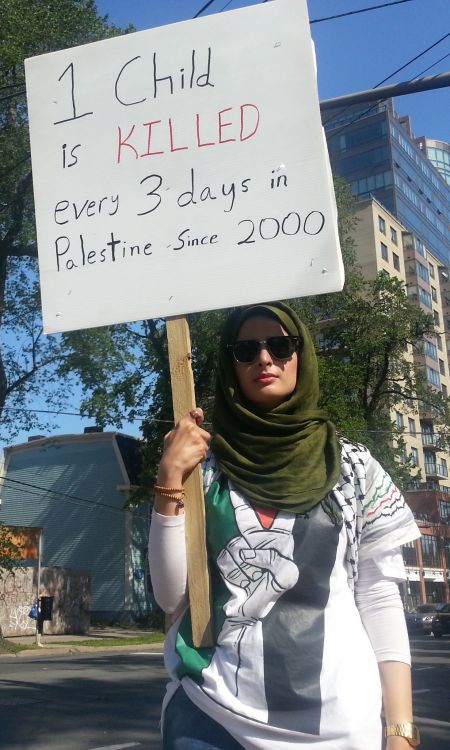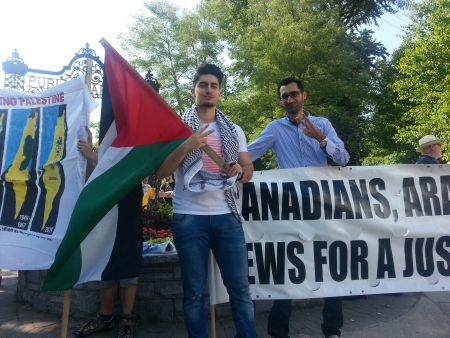K'JIPUKTUK, HALIFAX - It’s time for a wake up call.
That was the message at Tuesday’s protest to bring awareness to Israel’s most recent killings of Palestine civilians.
“These people have lives and families. They’re not just numbers,” said student and event organizer, Amer Zuheiri (his name has been changed to protect his identity) in an interview during the event.
More than 50 protestors led by Zuheiri’s group, Students Against Israeli Apartheid Dalhousie, picketed outside Halifax's Public Gardens to demonstrate against Israel’s ongoing use of collective punishment against innocent Palestinians.
They were joined in support by members of Canadians, Arabs, and Jews for a Just Peace, Independent Jewish Voices and Rad Pride Halifax.
Following the recent kidnapping and deaths of three Israeli teenage boys by a Palestinian militant group, Israel initiated a violence campaign in Gaza, so far killing more than 30 people and arresting nearly 600 more, including women and children, Zuheiri explains.
“These people were innocent,” the third-year engineering student says. “They have nothing to do with the conflict Israel is blaming them for.”
Under the 1949 Fourth Geneva Convention, collective punishment—the act of taking violence on a group of people as a result of another’s behaviour—is defined as a war crime.
“Israel has a right to exist but it has to exist in peace with its neighbour. The only way they’re going to do that is if Palestine has its own state,” said Larry Haiven, a member of Independent Jewish Voices—a Canadian organization against Israel’s occupation.
He believes Israel is using the teenagers' deaths as an excuse to unleash brutality on the entirety of the Palestinian people.
Recently, three Israeli men confessed to the kidnapping and murder of 16-year-old Palestinian Mohammed Abu Khdeir as a revenge for the deaths of the Israeli teens. Khdeir’s 15-year-old cousin was also found severely beaten after he was arrested without charge by Israeli police.
Canada’s inaction to stop the escalating violence is an act of condoning Israel’s apartheid regime, Zuheiri says.
“So we’ve taken it upon ourselves to raise awareness and make change.”
The student group, which began in March, plans to start a boycott, divestment and sanction campaign in the fall. It will ask Dalhousie’s students, faculty, and alumni to stop all investments and purchases of products that support Israeli occupation of Palestine.
In the meantime, Zuheiri says the group will continue to raise public awareness of the atrocities experienced by the Palestinian people.
But making people in the western world care about these tragedies is an extremely difficult wake up call, Haiven believes.
“(The violence) has to be brought home,” he says. “It becomes normal and we want to de-normalize it.”




